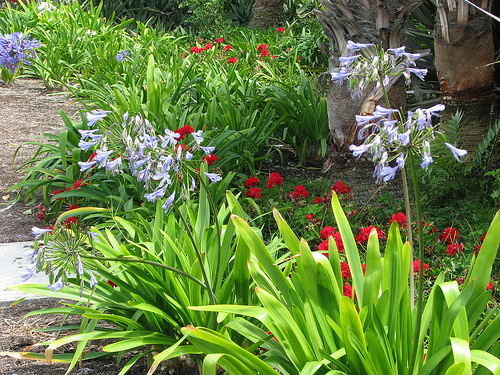Our 100 Species Challenge List
100 Species Challenge on Flickr.
Want to participate? Sign up at Sarah Sours’s blog.
(Victorian botanical art courtesy of The Graphics Fairy.)
(More buttons for the grabbing here.)
Our list-in-progress (scroll down for photos and descriptions):
1. Chaparral Yucca
2. Lily of the Nile
3. Pelargonium
4. Grape soda lupine
5. Bush ice plant
6. Coulter pine
7. Mondale pine
8. Coastal live oak
9. California black oak
10. Manzanita
11. Prickly pear cactus
12. California poppy
13. King palm
14. Bird of paradise
15. Canterbury bells
16. California pepper tree (Schinus areiria)
17. Jade tree
18. Eucalyptus
19. Pomegranate
20. Jacaranda
21. Bottle-brush tree (Callistemon)
22. Jasmine
23. Morning glory
24. Blue plumbago (leadwort)
25. Salvia
26. Bougainvillea
27. Magnolia
28.
1. Chaparral Yucca
Latin Name: Hesperoyucca whipplei
Other common names: Our Lord’s Candle, Spanish Bayonet, Chaparral Yucca
Where we first saw it and learned its name: Mission Trails. (Posted about it here.)
And now we see it all over town. Sometimes it is huge!
I love how the common names reflect local history. I like to imagine it was Father Junipero himself who named the magnificent white flower-spire “Our Lord’s Candle.” “Spanish Bayonet” speaks to some grimmer history!
2. Agapanthus, or Lily of the Nile
Also called African lilies, these lovely shrubs grow in our front yard and all over town. Their bloom season is just passing now, so the globes of purple or white blossoms at the top of each long stalk are looking a little bedraggled these days. But all summer long they were gorgeous. You see them often in median plantings and commercial landscaping, often intermingled with the earlier-blooming bird-of-paradise flowers (that’ll be a future entry).
3. Pelargonium
The red geraniums in the photo above give me a freebie for our challenge. Of course everybody knows what they are. Not that they are really geraniums—the correct name is pelargonium—but geranium is what everyone I’ve ever known has called them. On the east coast, we planted them as summer annuals or grew them in our windowsills. They’re still in my windows here, but they’re also in the ground, all over the place, sometimes in the form of huge bushes. I’ve adored them ever since Anne Shirley bestowed a kiss and a name (Bonny, of course!) on the red geranium blooming in Marilla’s kitchen.





